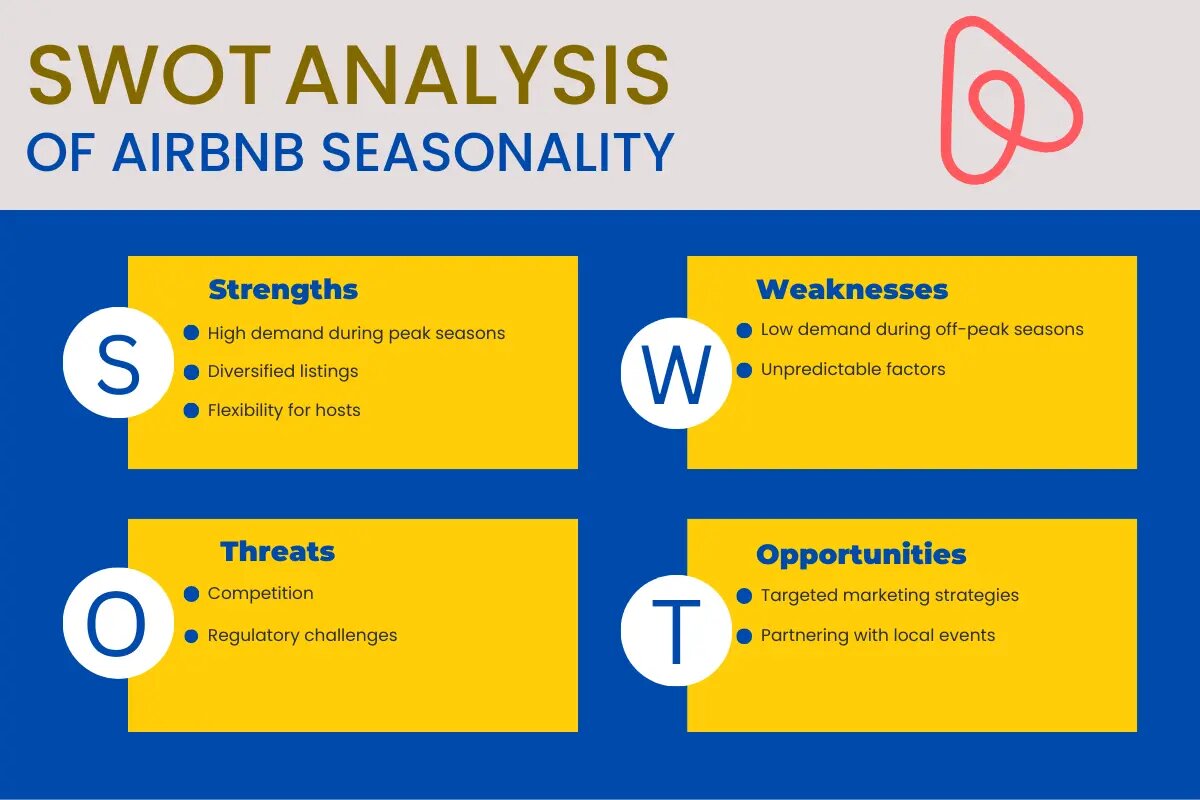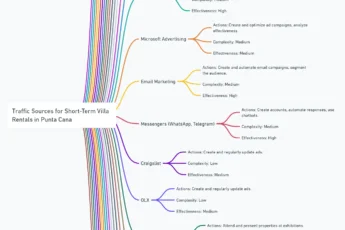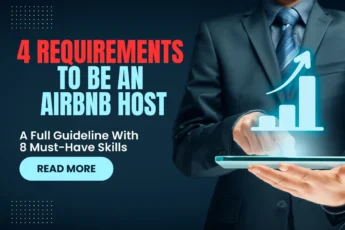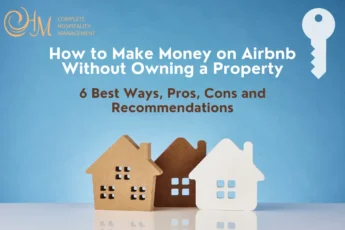Importance of Airbnb Seasonality – 6 Criteria, SWOT Analysis & 5 Tips to Attract Travelers During Low Season in 2024
Lots of events punctuate the annual calendar, attracting many travelers to the destination where you rent out properties. A real boon for you, you still have to anticipate these potential booking peaks and know how to exploit them flawlessly. If you rent out property on this platform, here are some tips to optimize your listings to Airbnb seasonality!

Complete analysis of the Airbnb seasonality
Airbnb seasonality and fluctuation
in tourist flows
Seasonality in the hospitality industry is a phenomenon that results from two factors.
- First, climatic factors combine all the environmental and natural elements, namely the seasons. This factor is responsible for the periods of tourist frequentation of specific destinations. In the mountains, seasonality is very marked; most turnover is achieved in winter, while summer is much calmer. The situation is reversed for seaside destinations.
- Institutional factors are the second factor. This factor results from decisions reached at the national level, the school calendar, and holidays. These 2 periods are the most suitable for organizing holidays, especially for families with school-going children.
Airbnb hosts see the occupancy rate of their properties vary under the pressure of seasonality. They must closely monitor this rate to identify their location’s high and low season periods. Although the impact of seasonality is less marked in large touristic places, it is a phenomenon that concerns most Airbnb hosts.
6 criteria likely to influence booking peaks
on Airbnb
Because every day is unique on Airbnb, you are recommended to be a host on the platform to keep up to date with the activities in your area. This allows you to understand that there are essentially 6 criteria that can help you predict a fluctuation in peak bookings on Airbnb. Which are :
- Local fairs and events (major)
- Seasonality of demand (major)
- Weekday fluctuations (minor)
- Nearby property occupancy and prices (minor)
- Flight arrivals and departures (minor)
- Booking rate on Airbnb (minor)
Of course, you can select more or even fewer factors for your region. However, you can do this after a few full seasons to have at least some statistics. So, if you want to define other crucial criteria for your properties, you can choose vacation rental consulting with a professional team of CHM Inc.
Impact of trade fairs and local events
on the booking rate
The major criterion likely to influence the occurrence of booking peaks is local fairs and events. They strongly impact the rates and Airbnb seasonality. This impact is all the stronger when your accommodation is located in the district hosting the event. We dare to imagine the ceilings that prices can reach in cities hosting the G7, G20, festivals of all kinds or international competitions.
Influence of weekdays on Airbnb seasonality
In general, hotel prices are revised upwards on Tuesday and Wednesday. This is explained by the fact that these are preferential days during which business travelers prefer to travel. Because of meetings on Thursday and Friday, relaxation sessions on Saturday, and return to their cities/countries on Sunday.
So if your accommodation is in a business district or neighborhood where Airbnb business rentals have increased, we recommend adjusting your rates during these two days. They are outside the peak periods generated by the 2 major criteria above.
Also, it seems obvious that the price of weekends can also be increased since people travel more on weekends than on Mondays or Tuesdays.
Impact of nearby Airbnb property or
hotel occupancy and prices
One of the least expensive methods of studying the competition is to simulate stays at local hotels and other Airbnb listings. You are competing with these hotels since you offer tourist or seasonal/vacation rentals.
Make the day before your credo by simulating in the days preceding the occurrence of one of the major criteria (festivals, events, fairs & seasonality) the reservation of property on the sites of nearby hotels. The fewer free dates there are, the more reservations there are and, therefore, the more occupancy there will be.
This data allows you to adjust your ad’s price without taking too many risks to get the maximum benefit.
Influence of arrivals and departures at airports
on Airbnb seasonality
Scanning aerial activity is not rocket science. The websites of most airports provide this information on a self-service basis. If your local airport does not, you can always go there and analyze the billboards to see the number of connections or the type of planes increase.
Bigger planes = more passengers = more arrivals. This information is essential for managing the price of your accommodation on Airbnb. Also, if a company serves the city where you rent out your accommodation twice a week, the days concerned may be revised in terms of prices.
SWOT analysis of Airbnb seasonality
SWOT analysis is a strategic planning tool that helps organizations evaluate their internal strengths and weaknesses and external opportunities and threats. In the context of Airbnb seasonality, we’ll focus on understanding the strengths, weaknesses, opportunities, and threats related to how Airbnb performs during different seasons throughout the year.

SWOT analysis of the Airbnb seasonality
Strengths:
- High demand during peak seasons: Airbnb experiences increased bookings and higher revenue during popular travel periods, such as holidays and peak vacation months.
- Diversified listings: Airbnb offers a wide range of accommodation options, including apartments, houses, and unique stays, which can cater to various seasonal preferences.
- Flexibility for hosts: Seasonality allows hosts to adjust pricing and availability based on demand, maximizing their potential earnings during peak times.
Weaknesses:
- Low demand during off-peak seasons: Airbnb might face decreased bookings and revenue during slow travel periods, leading to potential income fluctuations for hosts.
- Unpredictable factors: Seasonal demand can be influenced by unpredictable weather events, travel restrictions, or economic conditions.
Opportunities:
- Targeted marketing strategies: Airbnb can leverage seasonal trends to develop targeted marketing campaigns to attract travelers during specific periods.
- Partnering with local events: Collaborating with local events or festivals during certain seasons can attract more visitors to the area.
Threats:
- Competition: Other accommodation providers, hotels, or vacation rental platforms may offer aggressive pricing and promotions during high seasons, potentially diverting customers away from Airbnb.
- Regulatory challenges: Some regions may impose restrictions or regulations on short-term rentals, affecting Airbnb’s operations during certain seasons.
To capitalize on the strengths and opportunities while mitigating weaknesses and threats, Airbnb can implement the following strategies:
- Implement an intelligent pricing strategy that adjusts rates based on seasonal demand, local events, and historical booking data.
- Offer special promotions and discounts to attract guests during off-peak seasons, encouraging them to travel during less busy times.
- Forge partnerships with local event organizers, tourist attractions, or businesses to promote Airbnb as a preferred accommodation option during specific events or seasons.
- Expand operations to regions with complementary seasonal patterns, reducing reliance on a single seasonal trend.
- Engage with guests through personalized marketing and loyalty programs, encouraging repeat bookings during different seasons.
- Work closely with local authorities and adhere to regulations to minimize the impact of potential legal challenges on seasonal operations.
By conducting a thorough SWOT analysis and implementing strategic measures, your Airbnb will better adapt to seasonality and enhance its overall yearly performance.
How to predict Airbnb seasonality and peak bookings
The increase in the rate of reservations on Airbnb logically induces a peak in reservations. As a result, predicting a peak in reservations is akin to predicting the amplification of this rate of reservations on Airbnb. How to achieve it then?
Stop fooling ourselves. The world as it is today is almost ruled by money. Without money, we can do almost nothing. As a result, there is nothing wrong with wanting to maximize your earnings and generate greater profits by optimizing your vacation rental business.
Analyzing Airbnb booking patterns: seasonal and external Influences
| Steps | Considerations |
|---|---|
| 1. Gather historical booking data | – Obtain data for at least 2-3 years to identify seasonal patterns. – Analyze data on a monthly or quarterly basis to understand fluctuations. |
| 2. Identify peak booking periods | – Look for months or specific weeks that consistently have high booking volumes. – Take note of major holidays, festivals, and events that attract travelers. |
| 3. Analyze demand drivers | – Identify factors influencing demand, such as weather, local attractions, or business conferences. – Consider how these factors vary across different seasons. |
| 4. Examine booking lead times | – Study the time gap between booking and check-in for each season. – Short lead times may indicate last-minute bookings during peak periods. |
| 5. Explore pricing patterns | – Observe how listing prices change during high and low-demand seasons. – Look for price surges during peak periods. |
| 6. Evaluate external factors | – Consider the impact of travel restrictions, economic conditions, and global events. – Local events can significantly influence seasonal demand. |
| 7. Utilize data analytics tools & techniques | – Implement statistical models like time series analysis or regression. – Leverage machine learning algorithms to forecast future demand. |
| 8. Create a predictive model | – Build a model that takes into account historical data and relevant variables. – Continuously update the model as new data becomes available. |
| 9. Monitor and adjust predictions | – Regularly review the accuracy of predictions against actual bookings. – Adjust the model and factors as necessary to improve accuracy. |
The ultimate goal of forecasting peak bookings on Airbnb is to adjust your accommodation prices based on traveler demand, maximize profits after deducting charges and taxes. To do this, regularly study the market and Airbnb competition to optimize your earnings.
5 tips for attracting travelers
in Airbnb low season
Airbnb hosts are advised to consider some solutions to attract customers during off-peak periods.
1. Identify the target travelers
The first step is determining the auditory likely to be interested in a low-season stay. We find: retirees, couples without children, families with children who don’t attend school, and foreign travelers (different holiday periods). The school calendar does not constrain these traveler profiles. They prefer vacations in the low season to avoid mass tourism.
2. Encourage travelers to come and stay in your Airbnb property
Airbnb hosts can offer exclusive formulas (e.g., accommodation + relaxation package) only valid in low season; this creates added value. For this, it is necessary to identify what the travelers are looking for during their stay to make them offers adapted to their expectations. At the same time, it is wise to offer different prices according to seasonal periods.
Although most travelers are influenced by the seasons, business travelers are unconcerned about this element. Professionals move year-round between conferences, meetings, or trade fairs. This clientele tends to spend more during their stay than leisure travelers. It is, therefore, an exciting target for absorbing the negative effects of seasonality on the results of hosts.
To attract this clientele, Airbnb hosts are advised to offer suitable infrastructure: meeting rooms, offices… An investment that can pay off big in the long term.
3. Follow Airbnb seasonality trends
When you offer your short-term rental in high season, it is quite possible to decorate it “lightly”. For example, you can hang a few decorative balls or a light garland during Christmas. This attention will please travelers who will be more inclined to return to you for a future stay.
It is, therefore, necessary to follow seasonal trends and make your rental a unique accommodation. For example, having an air conditioner installed for the summer is a real asset for your home. There are remotely controllable ACs. The same goes for heaters when the temperatures cool down.
Allow the tenant to travel light by equipping your property according to its location and the season. In a rental by the sea, offer beach towels or a parasol, and in the chalets in the mountains, sleds, snow shovels, or hiking sticks.
4. Review the prices of your vacation rentals
Your main objective is to maximize your reservations, to do so, have flexible prices. Airbnb seasonality trends will constantly affect the price of your short-term rentals. Renting a chalet in the mountains will not have the same cost in December and August. In the same way that renting a house by the beach will not have the same price in July and November.
This is the principle of supply and demand. Since during high season there are more travelers and less choice, prices will increase.
In Airbnb’s low season, there are far fewer travelers, so plenty of accommodation will be available. Having an attractive price is a good argument to convince tenants.
Look at the calendar of your seasonal rentals and anticipate the low and medium seasons. So you can offer promotions based on trends. During weekends and high seasons, you will potentially receive more booking requests, increase the price of your furnished rental while remaining consistent with market prices.
In concrete terms, your prices must follow seasonal trends. There are services like the one offered by CHM Inc., namely Airbnb profile setup, to estimate the price of your rental. Your designated account manager will provide you with the best possible support for this step.
5. Adapt your listings in accordance with Airbnb seasonality
As a reminder, your listings must attract the eye of tenants who project and visualize part of their vacation through the property you offer them. Your listings should be up-to-date and correlate with the time of year.
Consciously or not, a traveler looking for a seasonal rental by the week for August, expects to find certain elements in the listing. Their eye will be more attracted to bright photos.
A practice particularly appreciated by travelers is highlighting the activities near your vacation rental.
- If your house or apartment for short-term rental is located 200 meters from a water park or a beach, these are elements to promote in summer.
- A toboggan run 300 meters from your chalet in the mountains will make more than one traveler envious in December! Thus, to highlight a seasonal rental out of season, the activities are a very good argument.
Airbnb Superhost’s tip: Stock quality photos of your property, one per season: summer for bright sunshine on the facade/living room, autumn for charming leaf colors in the garden/entrance, and winter with snow for mountain accommodations. If you want to get professional images for your property, you definitely must look at our photo & video packages which help to increase sales by 3 times!
Conclusion
So, to manage to inspire travelers all year round, whether in high or low season, do not hesitate to make changes to your accommodation as well as to your advertisements, we are thinking in particular of photos and descriptions.
Off-season dates are not necessarily to be excluded from your short-term rental calendar. Although reservations are less numerous, a certain part of travelers wait for these off-peak periods to organize their trips.
Frequently asked questions about
Airbnb seasonality
1. What are Airbnb major challenges?
All Airbnb hosts face many obstacles in their business. Among the most common, the following six can be distinguished:
- Adaptation and fulfillment of regulatory requirements in different cities and countries. Many cities have placed restrictions on short-term rentals, raising questions about zoning, safety, taxation and housing availability.
- Airbnb has faced numerous legal challenges from local governments, hotel associations and resident rights groups. These cases often involve issues of taxation, housing regulation and unfair competition.
- Maintaining trust and ensuring the safety of guests and hosts is critical. The platform has faced cases of fraudulent listings, property damage, theft and security issues. Addressing these issues and improving security measures is an ongoing task.
- Ensuring consistent quality among the large number of listings on Airbnb. Hosts have different standards and there have been cases of manipulated or inaccurate property descriptions resulting in unsatisfied guests.
- With millions of users and bookings, ensuring efficient customer service. Responding to inquiries, resolving disputes, and handling cancellations or returns require a strong support system.
- As a platform that handles sensitive user data, Airbnb faces privacy and security challenges. Protecting user information from breaches, complying with data protection legislation, and building trust with users are ongoing issues.
If you want to learn more about the top 12 challenges Airbnb hosts face, you can check our article on this topic and get the best solutions to all the issues you may deal with during your business activity with the platform.
2. What are Airbnb slow season?
Airbnb’s slow (or low) season is a period when the demand for apartments or properties rented through Airbnb decreases. This can happen for a variety of reasons, such as worsening weather conditions, peak holiday travel, low season for tourist or event bookings, etc.
During Airbnb’s slow season, some hosts may lower prices or make special offers to attract more guests. Homeowners can also use this time to make repairs or improve the quality of their properties to be ready for the next peak season.
3. How to survive slow season Airbnb?
Navigating Airbnb’s slow season can be a challenge for hosts, but there are a few steps that can help you stay stable and even find new opportunities:
- Research listings and prices of your competitors who offer their properties in your area/district. Think about how you can stand out, outperform them, and offer potential guests a better experience.
- You may try to make your rates lower or set some special offers with discounts. For instance, you may set a 30% discount for long-term bookings. This can attract more guests and stimulate them to book with you.
- Review your Airbnb listings and make sure they look attractive and professional. Add high quality photos, update descriptions, and provide detailed information about your property’s amenities and benefits.
- Add your accommodation to other rental platforms such as Booking.com, Vrbo or HomeAway. So you can increase the employment of your apartments and, accordingly, income.
- Use social media, email, and other marketing channels to promote your listings. Create attractive content that makes people want to come to you.
- Use low season on Airbnb to make repairs, improve amenities, and update decorations. Offer your guests something special and comfortable to increase the likelihood of positive reviews and repeat bookings.
- Cooperate with local travel agencies, restaurants, museums, , to attract more toursist visiting your city. Offer special promo codes or packages to guests who have used the services of your partners.
Follow these crucial tips; they will surely help you attract more guests during Airbnb’s slow season and stabilize your rental business.
4. What does Airbnb consider a month?
Airbnb considers a month to be 30 days or more. This implies that if a visitor makes a reservation for 30 days or more, it is considered a month-to-month reservation.
Month-to-month bookings have a few highlights compared to short-term bookings. For case, month-to-month bookings may have distinctive rates than short-term bookings, and visitors may get a rebate for longer remains. Too, month-to-month bookings may have more adaptable cancellation arrangements.
Month-to-month bookings may be subject to particular rules and limitations forced by nearby laws and Airbnb approaches. For case, a few neighborhood specialists may require extra enrollment or authorization for long-term letting.
5. What is the biggest threat to Airbnb?
One of the greatest threats to Airbnb is control and lawful confinement in different cities and nations. Numerous places have neighborhood laws that confine or direct short-term rentals. This may include restricting the rent’s length, requiring permitting or enlistment, installing charges, and compliance with particular security controls. Disappointment to comply with such laws can result in fines and lawful issues for Airbnb and its has.
In expansion, competition is another vital risk. The showcase has become more competitive with the development of other platforms for vacation rentals, such as Booking.com, Vrbo, HomeAway, and others. This implies that has ought to battle for guests’ consideration and compete for bookings, which can influence their profitability.
At last, financial components such as financial emergencies and changes within the travel and tourism industry can influence the request for convenience through Airbnb. For illustration, the widespread COVID-19 has hit the travel industry and driven a noteworthy diminish in travel and bookings.
Finally, economic factors such as financial crises and changes in the travel and tourism industry can affect the demand for accommodation through Airbnb. For example, the COVID-19 pandemic has hit the travel industry and significantly decreased travel and bookings.
6. What are risk factors of Airbnb?
While Airbnb allows hosts to rent out properties and guests to find temporary accommodation, there are certain risk factors to consider:
- Non-compliance with rules and laws. Some cities have restrictions on short-term rentals or require special licenses. Failure to comply with such rules may result in fines or legal problems.
- Property damage. While Airbnb provides some damage insurance, it can be limited, so it’s important to carefully review guest profiles and set policies to ensure property safety.
- Dissatisfied guests. Sometimes guests may violate the rules of cohabitation, create noise, chat with neighbors or cause inconvenience. Along with setting clear rules, keeping in touch with neighbors and responding to complaints quickly and efficiently can be helpful.
- Cancellation of reservations. There is a risk that guests may cancel at the last minute, leaving the host with no profit and no opportunity to fill that date with another booking. Airbnb has a cancellation policy that may provide some compensation, but it doesn’t always work.
- Conflict resolution. Sometimes there are issues between hosts and guests related to the condition of the accommodation, misunderstandings about the rules or other problems. It is essential to have an effective mechanism for resolving such conflicts and to be able to communicate properly with guests.
To better navigate conflict situations with guests and avoid them in general, we recommend that you read our article on communication in the hospitality industry.
7. How do I set seasonal minimum stay on Airbnb?
To set a seasonal minimum stay on Airbnb, you can follow these steps:
- Log in to your Airbnb account.
- Go to your Airbnb dashboard or calendar.
- Click on the particular listing for which you need to set a nights to stay.
- Tap on the calendar to choose the dates you want to set this minimum.
- Once you’ve chosen the dates, a window or sidebar ought to show up with choices to modify the settings for those dates. Seek for an option related to minimum stay requirements or rules.
- Adjust the settings in accordance to your Airbnb seasonality. You’ll be able set a particular number of nights needed for those dates.
- Save the changes or update the calendar settings.
In case you have issues in finding specific options, you can contact Airbnb support. Also keep in mind that you established seasonal requirements can greatly affect the number of bookings. So, don’t overdo it.
8. What does add seasonal requirement mean on Airbnb?
This option allows Airbnb hosts to set specific requirements for certain periods. When you use this feature, you can set specific conditions such as minimum stay duration, specific check-in or check-out days, or other rules that apply only during certain seasons or dates.
For example, during a high-demand season, hosts may want to set a minimum stay requirement of 3 nights to ensure they receive bookings for a longer duration. Alternatively, hosts might choose to remove or reduce the minimum stay requirement during a slower season to attract more guests and fill their calendars.
“Add Seasonal Requirement” feature helps hosts manage easily and adjust their listing’s availability and requirements based on changing seasons, local events, or any specific periods they choose.
Updated on: . Author:






